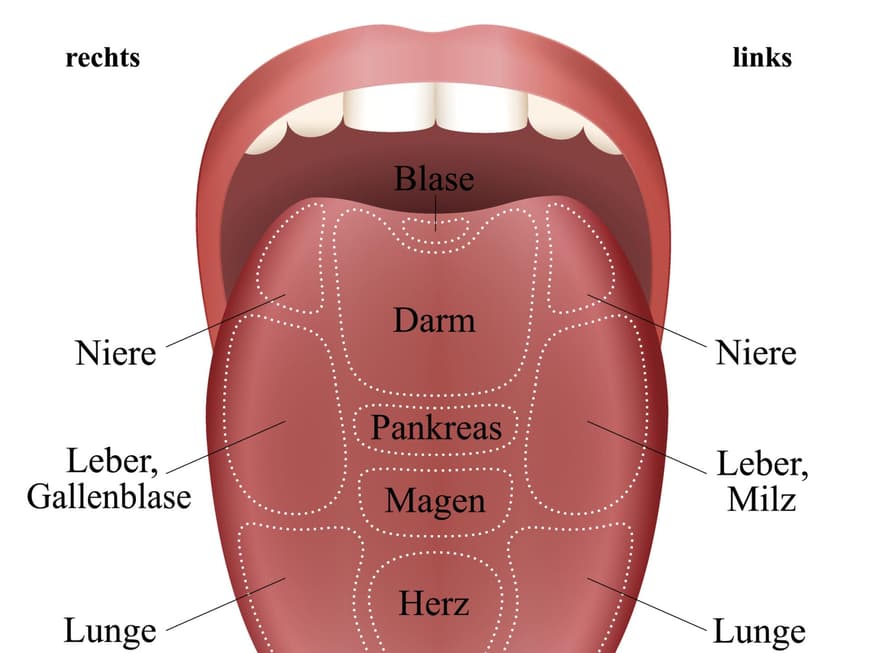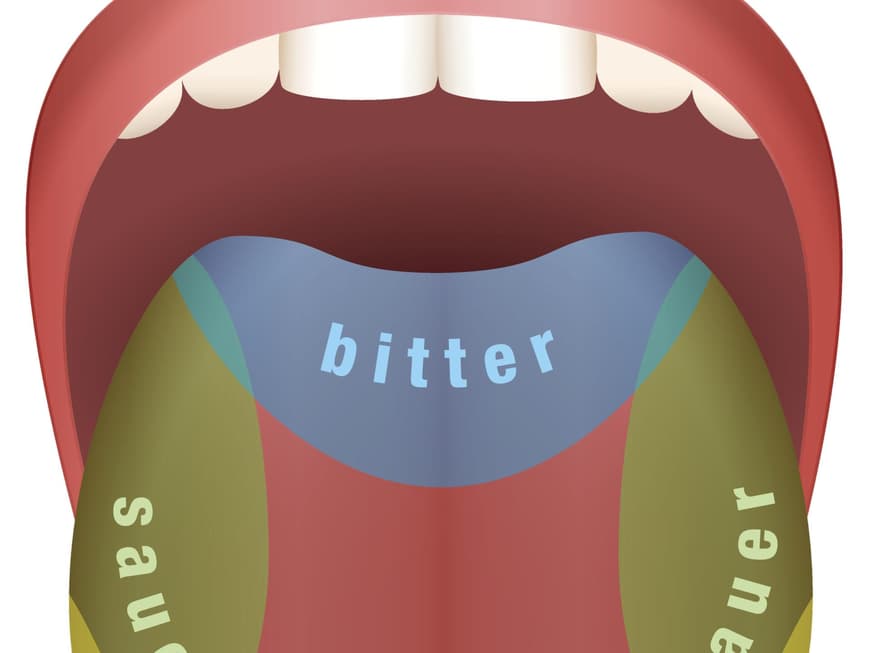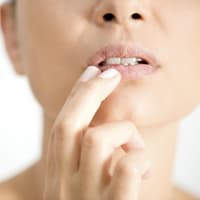Traditional Chinese medicine assigns reflex zones to the tongue, which are connected to the internal organs (see illustration): Where there are changes, the associated organ is weakening. The tongue is called the mirror of the body in Indian Ayurvedic medicine. Western physicians are also increasingly discovering it as a diagnostic tool, as the tongue changes color, becomes coated or swollen in many diseases.
Tongue and diseases: The color as a sign
A healthy tongue is pale red, has a smooth surface and smells of nothing. A whitish coating indicates a cold, a yellowish coating could be caused by a Candida fungus, if the tongue looks rather grayish, iron deficiency could be the cause. A white line only in the middle of the tongue may be a sign of a pancreatic disorder. A raspberry-red discoloration with small thickenings is usually caused by an infection such as scarlet fever. A black tongue can have many causes: certain medications, stress or a serious weakening of the immune system. Brown tongue coating can indicate kidney weakness. However, prolonged use of mouthwash containing chlorhexidine can also cause a brownish discoloration of the tongue. A deep red, smooth "lacquer tongue", on the other hand, warns of dangerous liver damage. It is considered an emergency, just like a dark red to blue tongue with a bluish underside, which indicates heart or lung problems.
Read also: Yellow tongue - what does the yellow coating mean?
Map tongue: What does it look like?
If the tongue has reddish areas with a white border that are constantly changing, this is a sign of so-called map tongue (lingua geographica). Occasionally there may also be a burning sensation and increased sensitivity, especially on contact with spicy, acidic or hot foods. The exact cause of these often chronic symptoms is not yet known, but they are not infectious and therefore pose no risk of infection.
Burning tongue: Where does it come from?
Anyone who has eaten spicy food is often "rewarded" with a burning tongue. Otherwise, there is a distinction between constant or intermittent tongue burning (tongue pain, glossodynia), which particularly affects middle-aged or older women. The symptoms can affect the whole mouth, which is why doctors refer to it as burning mouth syndrome (BMS). Often no cause can be identified, otherwise there can be numerous causes such as nutritional deficiencies and psychological or other underlying illnesses.
Tongue diseases: The shape of the tongue can indicate allergies or diseases
This can also change. Furrows and cracks indicate intestinal problems. If the tongue swells, inflammation may be the cause and must be treated. A suddenly swollen tongue can be life-threatening because the person affected has difficulty breathing - this is usually due to an allergy to food or medication.
Feeling in the tongue: an indication of deficiencies or menopause
If your tongue burns and is a little inflamed, this may be due to a vitamin B12 deficiency. Small, very painful blisters with a white border are probably aphthae - but they are harmless and disappear by themselves. In rare cases, a burning tongue, a change in taste sensation and dry mouth can indicate the onset of the menopause. Special tongue scrapers from the drugstore can be used to clean the sensitive organ and remove plaque and bacteria. Advantage: everything tastes better again. Vitamin B12 deficiency or metabolic disorders, on the other hand, can cause a burning sensation - have your blood levels of "Holo-TC" (active B12) and thyroid hormones tested. If your tongue suddenly feels swollen, this could be an acute allergy attack. See a doctor quickly
Recognizing tongue cancer
The tricky thing about tongue cancer (tongue carcinoma) is that symptoms rarely appear at first. Later on, the disease can make itself felt through a burning sensation in the mouth, difficulty swallowing or a sore throat. In this case, you should definitely visit your family doctor or dentist to detect a possible disease in good time. The most common causes of tongue cancer are regular consumption of tobacco and alcohol.
Tongue: How to do a self-test in front of the bathroom mirror
Carry out the test in the morning before brushing your teeth. It is best not to eat or drink anything except water beforehand. The result can also be falsified if you have consumed strongly coloring foods the evening before, e.g. red wine, black tea, beet. Stand in front of the mirror in good lighting. Daylight is ideal, otherwise use fluorescent light. Loosely stick out your tongue, note any abnormalities and check half an hour later to see if they are still visible.
You might also be interested in this:








